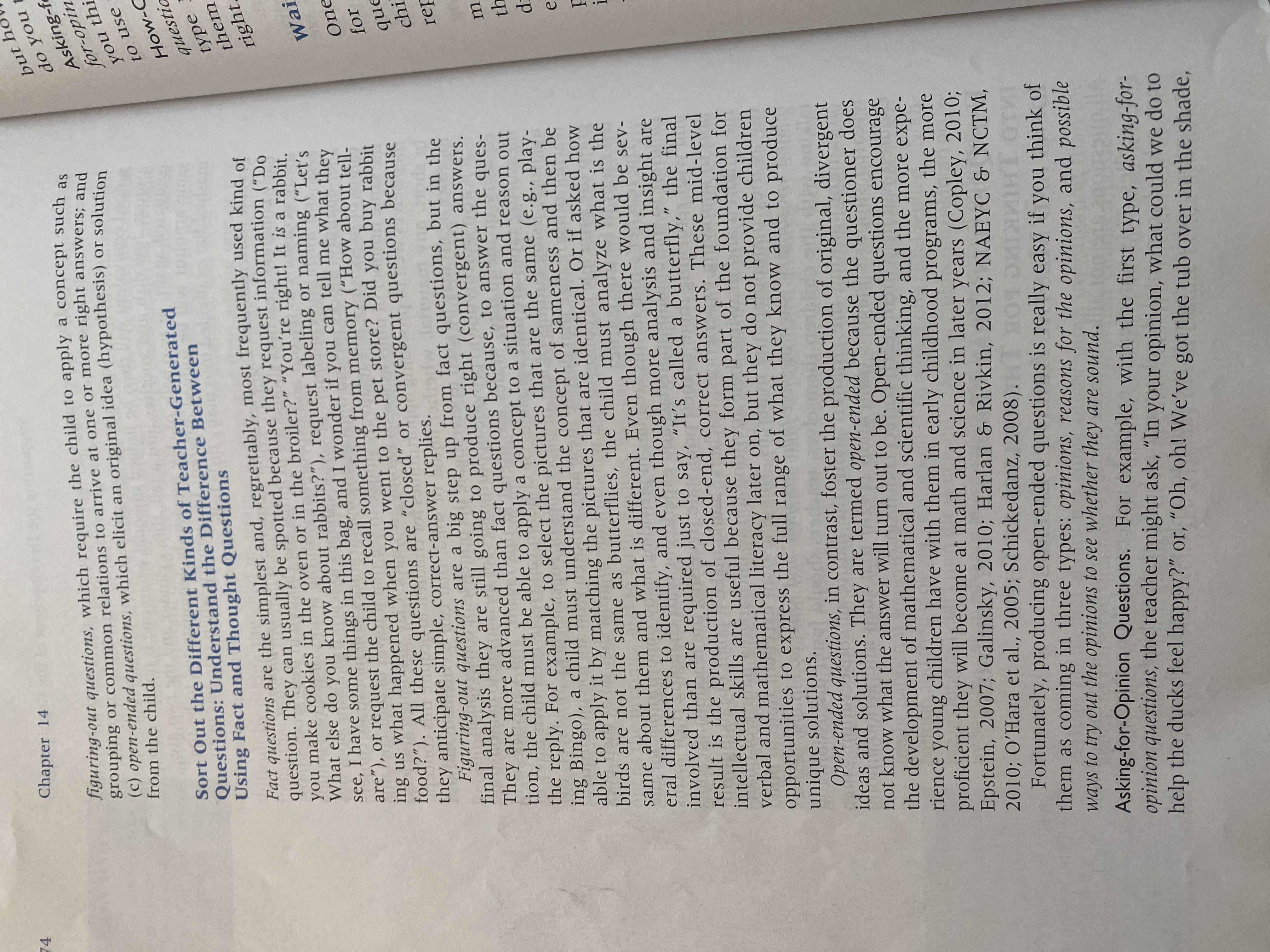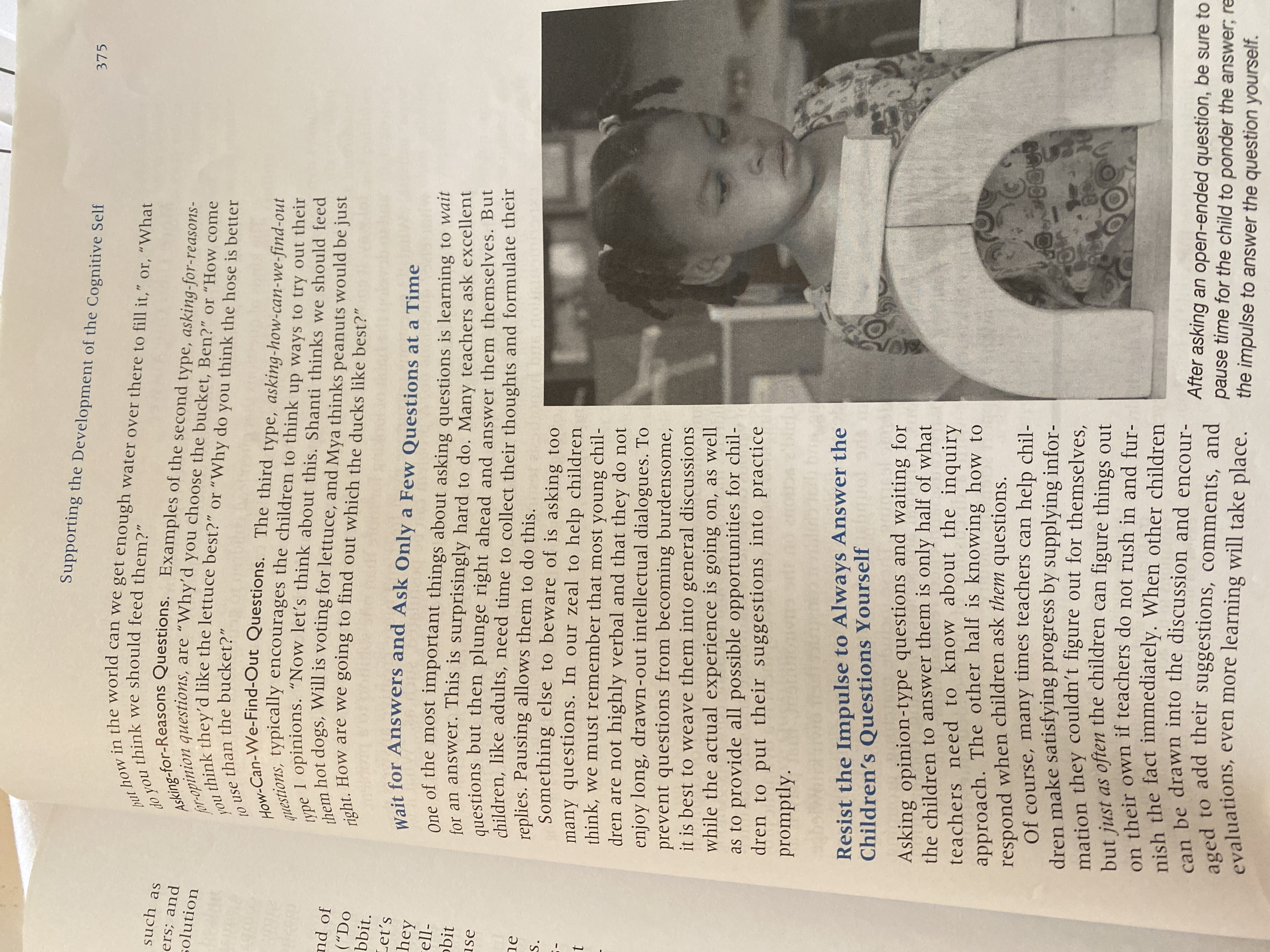Types of Teacher-Generated Questions for Effective Learning
Notes on Teacher-Generated Questions

Types of Teacher-Generated Questions
Fact Questions
- Definition: The simplest type of teacher-generated questions that request specific information.
- Examples:
- "Do you make cookies in the oven or in the broiler?"
- "What else do you know about rabbits?"
- Characteristics:
- Typically closed, expecting short, correct-answer replies.
- Used to check recall or factual knowledge rather than encourage deep thinking.
Figuring-Out Questions
- Definition: A more advanced level of questioning that requires critical thinking and conceptual application.
- Examples: Questions that ask students to analyze or compare items, such as identifying similarities and differences (e.g., comparing rabbits and bingo).
- Purpose:
- Encourage students to apply knowledge and reasoning to arrive at answers.
- Promote higher-order thinking as students engage in more than just recall.
Open-Ended Questions
- Definition: Questions designed to elicit original ideas and solutions without predefined answers.
- Characteristics:
- Foster creative thinking and problem-solving.
- Encourage exploration of mathematical and scientific concepts.
- Types:
- Asking-for-Opinion Questions: Encourage students to express personal views.
- Examples: "In your opinion, what could we do to help the ducks feel happier?"
- Reasoning for Opinions: Push students to justify their opinions, deepening understanding.
- Asking-for-Opinion Questions: Encourage students to express personal views.
- Importance:
- Fuel the development of critical thinking skills.
- Support cognitive and verbal development in young children.
Key Takeaways
- Recognizing different question types can enhance educational strategies.
- Progressing from fact questions to open-ended questions can better engage students and yield richer discussions.
- Open-ended questions are particularly beneficial in fostering curiosity and a love for learning in early education.
Reference:
www.ncbi.nlm.nih.gov
Best Practice Strategies for Effective Use of Questions as a Teaching ...
educationnorthwest.org
[PDF] Classroom Questioning - Education Northwest
citl.illinois.edu
Questioning Strategies - CITL
Supporting the Development of the Cognitive Self

Key Notes
-
Types of Questions:
- There are three main types of questions educators can use:
- Asking-for-Opinion Questions: These require personal input (e.g., “Why do you think they would like the lettuce best?”).
- Asking-for-Reasons Questions: These compel students to justify their opinions, fostering critical thinking (e.g., “Why did you choose that bucket?”).
- How-Can-We-Find-Out Questions: This type encourages experimentation and investigation (e.g., “How are we going to figure out which ducks like what?”).
- Thoughts: Utilizing different question types can cater to various aspects of cognitive development, helping students engage on different levels.
- There are three main types of questions educators can use:
-
Waiting for Answers:
- It’s crucial for educators to practice patience and allow children time to respond to questions.
- Many educators tend to answer their own questions right after asking. This reduces the opportunity for children to engage thoughtfully.
- Thoughts: By waiting, educators can encourage deeper thinking and allow children to articulate their ideas, which promotes a richer classroom discussion.
-
Encouraging Participation:
- Teachers are reminded to resist the impulse to constantly provide answers as it can inhibit children's ability to think independently.
- Allowing children to contribute suggestions and ideas leads to a more collaborative environment where all children can learn from each other's insights.
- Thoughts: Facilitating open discussions can empower children and enhance their confidence in sharing thoughts.
-
Promoting Inquiry-Based Learning:
- Encouraging children to ask their own questions is fundamental. This approach can help them take ownership of their learning.
- The process of inquiry cultivates a sense of curiosity and a desire for deeper understanding, essential traits for lifelong learners.
- Thoughts: This method aligns with modern educational philosophies that prioritize critical thinking and active engagement over rote memorization.
Summary of Concepts
Overall, the notes emphasize the significance of fostering a supportive learning environment through strategic questioning and encouraging children's participation in discussions. By understanding the types of questions and the importance of waiting for responses, educators can better facilitate cognitive development in young learners.
Reference:
globalonlineacademy.org
20 Questions that Promote Inquiry-Based Learning | GOA
lessonbud.com
The Art of Questioning: Techniques to Promote Critical Thinking and ...
www.edutopia.org
Fostering Student Questions: Strategies for Inquiry-Based Learning